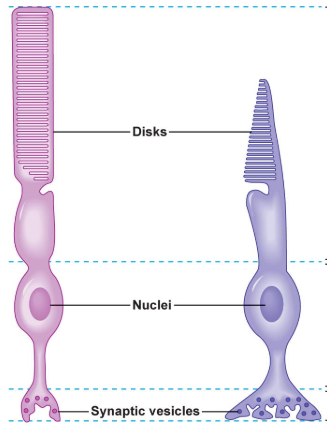 Multiple Choice Questions
Multiple Choice QuestionsThe black pigment in the eye which reduces the internal reflection is located in
retina
iris
cornea
sclerotic
Hearing impairment affects which part of brain?
Frontal lobe
Parietal lobe
Temporal lobe
Cerebellum
Assertion : Astigmatism is due to uneven curvature of lens.
Reason : It is treated with cylindrical lenses.
If both assertion and reason are true and reason is the correct explanation of assertion
If both assertion and reason are true but reason is not the correct explanation of assertion
If assertion is true but reason is false
If both assertion and reason are false
Assertion: Rhabdome is present in Palaemon.
Reason: Rhabdome has an important role in digestion
If both assertion and reason are true and reason is the correct explanation of assertion
If both assertion and reason are true but reason is not the correct explanation of assertion
If assertion is true but reason is false
If both assertion and reason are false.
Given below is a table comparing the effects of sympathetic and parasympathetic nervous system
for four feature (a-d). Which one feature is correctly described
| Feature | Sympathetic nervous system | Parasympathetic nervous system |
| a) Salivary glands | Stimulate Secretion | Inhibit Secretion |
| b) Pupil of the eye | Dilate | Constricts |
| c) Heart rate | Decreases | Increases |
| d) Intestinal peristalsis | Stimulates | Inhibits |
B.
| b) Pupil of the eye | Dilate | Constricts |
Sympathetic and parasympathetic nervous system are the parts of autonomic nervous system. Autonomic nervous system is a part of peripheral nervous system that supplies stimulation via motor nerves to the smooth and to cardiac muscles (the involuntary muscles) and to the glands of the body. The activity of the ANS is controlled principally by the medulla oblongata and hypothalamus of brain. Sympathetic and parasympathetic nervous system tend to work antagonistically on the same organ.
| Feature | Sympathetic nervous system | Parasympathetic nervous system |
|
a) Salivary glands b) Pupil of the eye c) Heart rate d) Intestinal peristalsis |
Inhibit Secretion Dilate Increases Inhibits |
Stimulate Secretion Decreases Increases Stimulates |
Examine the diagram of the two cell types A and B given below and select the correct option

A B
Cell A is the rod cell found evenly all over retina
Cell A is the cone cell more concentrated in the fovea central is
Cell B is concerned with colour vision in bright light
Cell A is sensitive to low light intensities
A person who shows unpredictable moods, outbursts of emotion, quarrelsome behaviour and conflicts with others is suffering from
borderline personality disorder (BPD)
mood disorder
addictive disorder
schizophrenia.
Unidirectional transmission of a nerve impulse through nerve fibre is due to the fact that
nerve fibre is insulated by a medullary sheath
sodium pump starts operating only at the cyton and then continues into the nerve fibre
neurotransmitters are released by dendrites and not by axon endings
neurotransmitters are released by the axon endings and not by dendrites.
The total number of nitrogenous bases in human genome is estimated to be about
3.5 million
35 thousand
35 million
3.1 billion.
A person is wearing spectacles with concave lenses for correcting vision. While not using the glasses, the image of a distant object in his case will be formed
on the blind spot
behind the retina
in front of the retina
on the yellow spot
